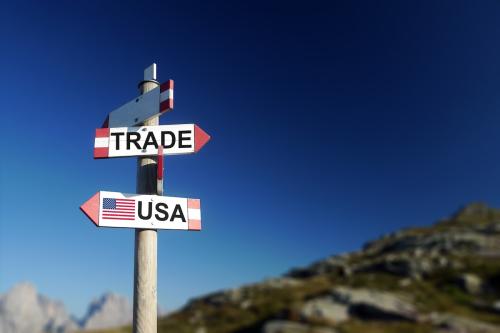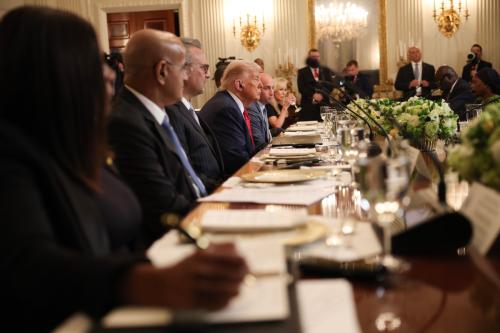“I urge U.S. businesses to really see all of the progress that has been made. The security situation has improved.” These were the words Secretary of State Hillary Clinton spoke on Tuesday as she introduced Iraqi Prime Minister Nouri Al-Maliki, who was in Washington, DC accompanied by some 1,000 Iraqi government officials, state-enterprise directors, and other business representatives, to attend a major investment conference. “Iraq is Open for Business,” says a brochure put out by the Iraqi National Investment Commission, which also goes on to laud the “security situation.” But while less violence on the ground is certainly needed to bring new investment, it is not enough.
More than six years after a U.S.-led coalition ousted Saddam Hussein, the standard of living in Iraq today is half what it was during the Saddam era and unemployment hovers at over 20 percent (not including those working part-time but seeking full-time employment). More ominously, youth unemployment is in excess of 30 percent. Meanwhile, Iraqi officials and businessmen struggle to lure foreign investment which still shies away from Iraq; the little investment that has flowed in has gone mainly to the oil sector and to the cement industry (not surprising given the need for concrete in Baghdad and other cities). The graphic shows that, while violence is dramatically down since its peak in 2005, foreign direct investment—merely a trickle to begin with—has also fallen.
Iraqi reformers, for all their heroic efforts, have been unable to send credible signals that Iraq’s investment climate is being improved. Three sets of fundamental reforms are needed.
First, the Iraqi government needs to restructure its economic bureaucracy—the vast Soviet-style apparatus that treats state-owned companies as mere sub-units of Iraqi ministries (and company directors as subordinates to ministers). Starting in 2006, the U.S. Department of Defense, in coordination with private management consulting and accounting firms, supported a large-scale evaluation of these companies and found that several of them could attract foreign investment, create jobs, and provide growth. This was a long-awaited reversal of the position held by the U.S.-led Constitutional Provisional Authority (CPA) that ruled Iraq between 2003 and 2004, that considered state companies an obstacle to economic growth, and did what it could to shut them down. But before these companies will attract private money, they need to be treated as just that—independent companies, with their own bank accounts, responsible for their own financing and business plans, and ruled by their own boards of directors.
Second, the jumble of overlapping, contradictory investment laws is in drastic need of streamlining. Right now, investors have to wade through a hodge-podge of Saddam-era laws, orders issued by the CPA, and more recent laws. A national investment law—on the books since 2006—which would protect foreign and domestic investors remains unevenly enforced.
Third, Iraqi workers need better (not more) social protection. Without a functioning system of unemployment insurance, allowing foreign investors to buy companies and fire workers would be political suicide for any Iraqi government. So workers cling to their subsidized jobs even though the factories they work for are idle. The threat of protests from unemployed workers prevents the government from taking even preliminary steps towards improving the Iraqi investment climate. A modern safety net would consist not simply of severance payment for laid off workers, but unemployment benefits, retraining programs, entrepreneurship training (for those who want it), and more importantly, youth training programs and other efforts to reduce unemployment and under-employment among Iraq’s young adult population.
A common complaint heard in Iraq—corruption—is found in many developing economies, and continues to be a problem in Iraq. But these other factors—an unreformed bureaucracy, an unclear regulatory framework, and the absence of social protections—create unique policy instabilities that are actually more detrimental to investment than corruption. A ministerial apparatus that maintains discretion over companies can change business and financing plans without going through a board of directors. Contradictory laws mean that regulations may be interpreted inconsistently. And the absence of long-term worker protections means that the Iraqi government and investors alike will face protests among the newly unemployed, or that regional officials may pressure investors to retain workers. Addressing these problems will help convince investors that Iraq is truly “open for business.”
The Brookings Institution is committed to quality, independence, and impact.
We are supported by a diverse array of funders. In line with our values and policies, each Brookings publication represents the sole views of its author(s).



Commentary
Op-edIraq’s Economy Needs More Than Security
October 23, 2009